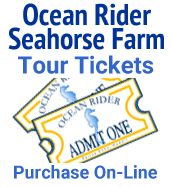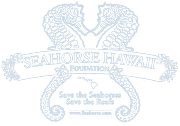Ocean Rider Seahorse Farm and Tours | Kona Hawaii › Forums › Seahorse Life and Care › Cloudy Eye › Re:Cloudy Eye
Dear Tammie:
Yes, I think a secondary infection may have set in following a mechanical injury to the female’s eye, and that is most likely what is causing the cloudiness. Administering a broad-spectrum antibiotic orally via gutloaded live shrimp should be helpful in clearing up the problem.
Gut-loading (i.e., bioencapsulation) simply means to fill live shrimp up with medication by feeding them food that’s been soaked in the desired medication. Once the feeder shrimp are full of the medicated food — that is, their guts are loaded with it — they are immediately fed to the seahorses, which thus consume the medication along with the shrimp. It’s a neat way to trick seahorses into taking their medicine, just as our moms used to do when we were little, crushing up pills in a spoonful of jelly or jam. Another term for gut-loading is bioencapsulation, since the medication is neatly contained within a living organism rather than a capsule. Gut-loading allows the seahorses to be treated in their main tank, where they are completely at home, surrounded by their tankmates and the rest of the herd, and is thus a very stress-free form of treatment.
The easiest way to administer antibiotics orally is by bioencapsulating or gutloading them in live shrimp, which are then fed to the seahorses. I prefer adult brine shrimp (Artemia spp.) for this for a number of reasons. For one thing, adult Artemia are inexpensive and readily available to the home hobbyist. Secondly, soaking live adult brine shrimp in a solution of the antibiotics as described below is by far the simplest and most convenient way to bioencapsulate antibiotics. Thirdly, a much wider range of antibiotics are effective when bio-encapsulated in live brine shrimp and administer it orally than can be used effectively as bath treatments for marine fish.
The recommended dosage of antibiotic for this procedure varies between 100-250 mg per liter or about 400-1000 mg per gallon of water. (Personally, I prefer to use the higher dosages when gutloading.) Stay within the suggested range and you should be all right.
If the antibiotic you are using comes in tablet rather than capsule form, crush it into a very fine powder (you may have to use a household blender to get it fine enough) and dissolve it in freshwater at the dosage suggested above. Soak the adult brine shrimp in freshwater treated with the antibiotic for 15-30 minutes and then feed the medicated shrimp to your seahorses immediately. (Don’t let your pumps and filters "eat" all the brine shrimp!)
The brine shrimp are soaked in freshwater, not saltwater, because in theory the increased osmotic pressure of the freshwater helps the antibiotic solution move into their bodies via osmosis. But in fact nobody knows for sure whether the antibiotic is diffusing into the brine shrimp or they are ingesting it in very fine particles (brine shrimp are filter feeders and will take in whatever is suspended in the water with them) or whether the brine shrimp merely become coated with the antibiotic while they are soaking in it. But that’s not important — all that really matters is that gut-loading adult brine shrimp with medications this way is effective.
As previously mentioned, bioencapsulating the adult brine shrimp in freshwater also greatly increases the range of antibiotics you can use for gutloading. Many antibiotics are ineffective when used as baths in saltwater because they don’t dissolve well in hard water at a pH > 8.0, or aren’t absorbed well through the skin and gills of fish, or because they combine with the carbonates in saltwater and are thus rendered inactive, or all of the above. That is why the marine dose for most antibiotics is much stronger than the dosage recommended for use in freshwater, but increasing the dosage only partially counteracts these problems.
The tetracyclines are a good example of this phenomenon. Although tetracycline and oxytetracycline generally work very well when administered orally, they are all but useless when used as bath treatments for marine fish. This is because the calcium and magnesium in hard water or saltwater binds to tetracycline and oxytetracycline, rendering them inactive (Yanong, US Dept. of Agriculture). In addition, tetracycline and oxytetracycline are photosensitive drugs and will decompose when exposed to light. So these drugs are very useful for seahorses when they are administered via bioencapsulation, but they are quite ineffective when added to the water in a saltwater aquarium (Yanong, USDA).
I would recommend feeding the female with the cloudy eyes in your aquarium one meal a day of live adult brine shrimp that has been bioencapsulated with antibiotics as described above, along with one feeding of Vibrance-enriched frozen Mysis each day. That will ensure that your seahorses get a daily dose of the antibiotics as well as a daily dose of beta-glucan to boost their immune systems.
Best of luck clearing up your female’s eye problem, Tammie!
Respectfully,
Pete Giwojna




